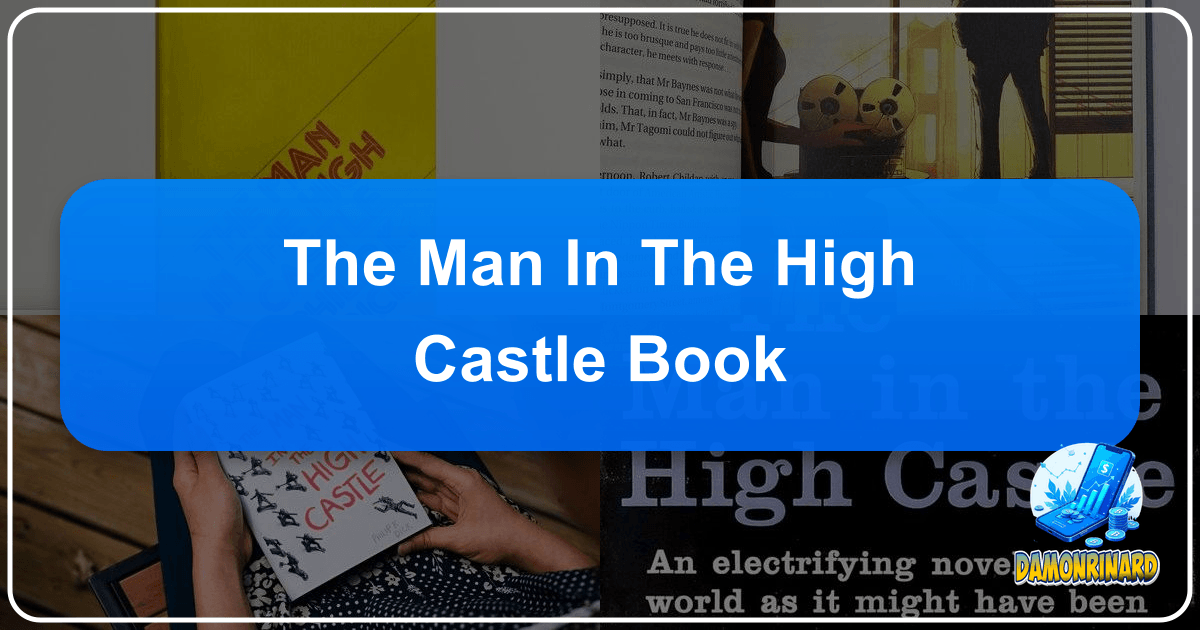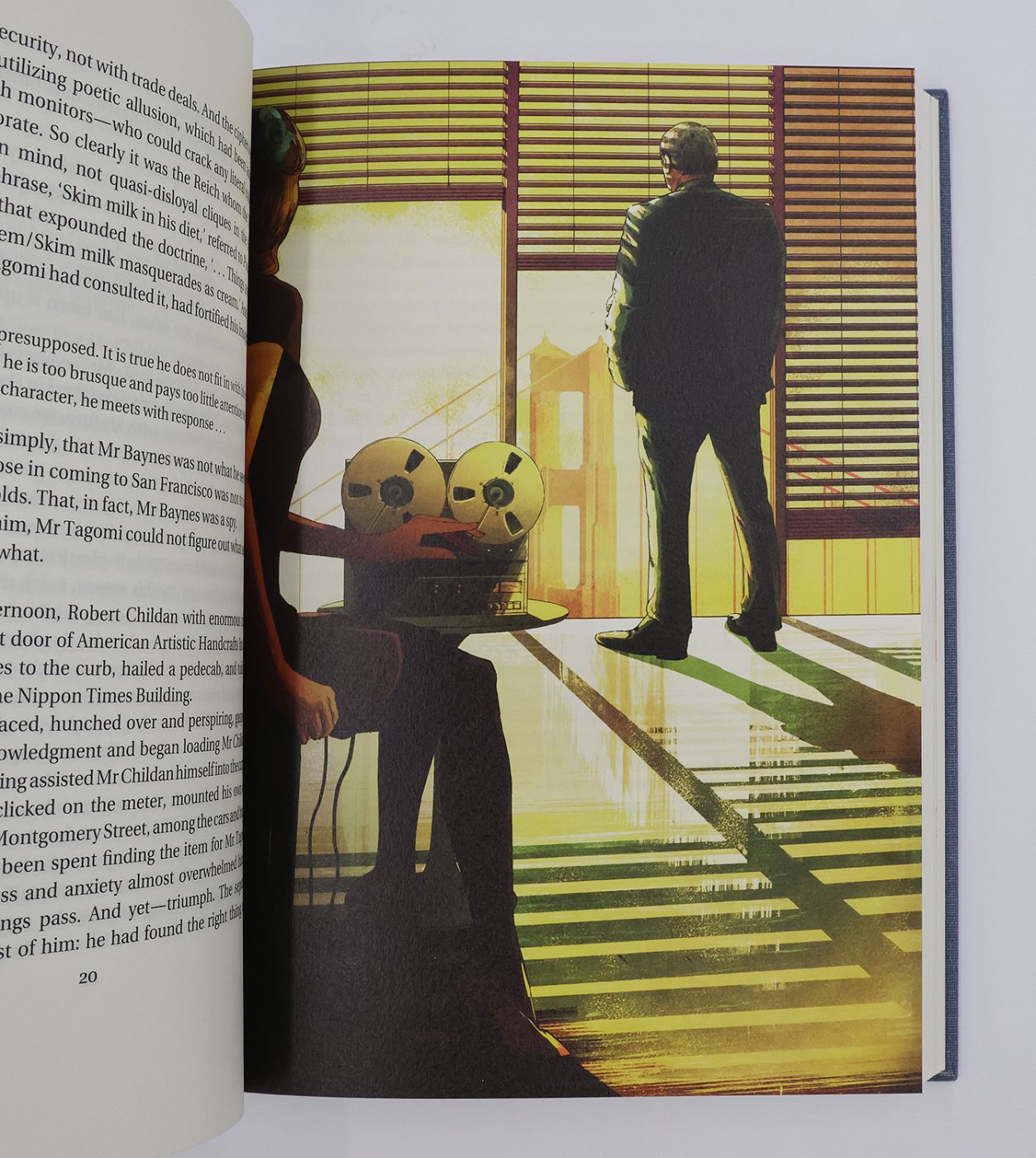Exploring the Dystopian Vision: A Deep Dive into The Man in the High Castle

Philip K. Dick’s The Man in the High Castle stands as a monumental work in speculative fiction, a chillingly plausible alternate history that continues to captivate readers and scholars alike. Published in 1962, this novel not only redefined the science fiction genre but also earned the prestigious Hugo Award for Best Novel, cementing its place as a literary classic. On Lbibinders.org, we celebrate such profound works that challenge our perceptions of reality, history, and human resilience. This exploration delves into the intricate layers of Dick’s masterpiece, examining its genesis, narrative brilliance, and enduring cultural resonance, all while highlighting its significance within the broader landscape of books, authors, reading, libraries, and cultural impact.

Philip K. Dick’s Visionary Craft and Inspiration
At the heart of The Man in the High Castle lies the singular genius of Philip K. Dick, an author renowned for his profound philosophical inquiries, unsettling explorations of reality, and unique narrative voice. Dick’s literary journey was marked by a prolific output, often delving into themes of identity, paranoia, the nature of consciousness, and artificial intelligence. The Man in the High Castle emerged from a period of intense creative output and personal reflection, influenced deeply by the anxieties of the Cold War era and the lingering specter of World War II.

The Genesis of an Alternate Reality
Dick’s inspiration for The Man in the High Castle was multifaceted. He famously consulted the I Ching, or the Book of Changes, an ancient Chinese divination text, to guide crucial plot developments and character decisions within the novel. This unconventional approach infused the narrative with a sense of cosmic determinism and philosophical depth, mirroring the characters’ own struggles with fate and free will in a world reshaped by historical trauma. The premise itself—a world where the Axis powers won World War II—was a daring thought experiment, a stark departure from the triumphalist narratives prevalent in post-war America. Dick meticulously imagined the socio-political implications of such a victory, crafting a landscape where the United States is divided into three territories: the Japanese Pacific States (occupied by Imperial Japan), the Greater Nazi Reich (controlled by Nazi Germany), and a neutral Rocky Mountain States serving as a buffer zone.

Dick’s writing style is characterized by its ability to seamlessly blend the mundane with the profoundly unsettling. He eschewed overly ornate prose in favor of a direct, often sparse style that allowed his complex ideas to take center stage. His characters, often ordinary people thrust into extraordinary circumstances, grapple with existential dread, moral ambiguities, and the constant questioning of what is real. In The Man in the High Castle, this manifests as a pervasive sense of unease and a subtle psychological tension, as characters navigate a world where historical truth is manipulated and individual freedoms are curtailed. The novel, like many of Dick’s famous works such as Do Androids Dream of Electric Sheep? (the basis for Blade Runner) and Ubik, forces readers to confront uncomfortable truths about power, perception, and the fragility of reality. Through his work, Dick challenged the boundaries of science fiction, elevating it to a vehicle for profound philosophical discourse.
Unpacking the World of Alternate History
The Man in the High Castle is a quintessential example of alternate history, a subgenre of speculative fiction that explores “what if” scenarios by altering key historical events. It is not merely a thought experiment but a meticulously constructed world that examines the profound implications of a different past on the present and future. As a foundational text within this genre, it invites readers on Lbibinders.org to consider the butterfly effect of historical decisions and the lasting echoes of power.
The Enduring Appeal of a “What If” Scenario
The novel’s central conceit—the Axis victory—is explored with chilling detail. Japan and Germany, now global superpowers, exhibit their distinct ideologies and spheres of influence. The Japanese Pacific States, encompassing the former Western United States, are characterized by a subtle, often polite occupation that nonetheless imposes cultural and political dominance. Meanwhile, the Greater Nazi Reich, controlling the Eastern United States, is a starkly totalitarian regime, marked by overt racism, eugenics, and an expansionist agenda. This intricate world-building allows Dick to explore themes of colonialism, racism, cultural assimilation, and resistance. The book deftly portrays the daily lives of individuals caught within this new world order, from antique dealer Robert Childan who caters to Japanese tastes, to trade commissioner Nobusuke Tagomi grappling with moral dilemmas, and the mysterious Frank Frink, a Jewish craftsman living under a constant threat of exposure.
The “Man in the High Castle” himself refers to the elusive author of The Grasshopper Lies Heavy, a book-within-a-book that depicts an alternate alternate history—one where the Allies won the war. This recursive narrative device is a stroke of genius, introducing multiple layers of reality and questioning the very nature of truth and historical records. It prompts readers to consider how history is written, who writes it, and the power of narrative in shaping collective consciousness. This complexity makes the novel a rich subject for book reviews and academic analysis, continually sparking new interpretations on Lbibinders.org and beyond. It is not merely a story about a different past, but a profound meditation on the construction of reality itself, a hallmark of classics that transcend their genre.
Engaging with the Narrative: Reading and Reflection
Reading The Man in the High Castle is more than just following a plot; it’s an immersive experience that challenges one’s perceptions and encourages deep reflection. The novel’s structure, pacing, and philosophical undertones make it a unique contribution to the world of literature, offering significant educational value and profound life lessons. On Lbibinders.org, we believe in fostering reading habits that engage with such complex texts, recognizing their power to transform understanding.
The Power of the I Ching and Existential Questions
One of the most distinctive aspects of the novel is the pervasive influence of the I Ching. Characters frequently consult this ancient oracle for guidance in their personal and professional lives, reflecting a profound sense of uncertainty and a search for meaning in a chaotic world. For example, Juliana Frink, one of the central characters, uses the I Ching to make life-altering decisions, her fate seemingly intertwined with its enigmatic pronouncements. This device not only adds an element of fatalism and chance to the narrative but also serves as a subtle critique of reliance on external authority, whether mystical or governmental. The I Ching becomes a metaphor for the search for truth in a world rife with propaganda and suppressed histories, prompting readers to question the sources of their own beliefs and decisions.
The novel’s educational value extends to its unflinching exploration of existential questions. What defines identity in a totalitarian state? How do individuals maintain their humanity in the face of systemic oppression? What constitutes true reality when historical facts are fluid? These are questions that resonate deeply with contemporary concerns about disinformation, power structures, and the nature of truth. The characters’ internal struggles—their doubts, their small acts of defiance, their longing for a different world—offer profound life lessons about resilience, the importance of individual conscience, and the subtle ways in which resistance can manifest. For students and general readers alike, The Man in the High Castle provides a potent lens through which to examine historical events, political ideologies, and the enduring human spirit. It encourages a reading habit that looks beyond the surface, seeking deeper meanings and drawing connections between fiction and the real world.
The Enduring Legacy and Cultural Impact
The impact of The Man in the High Castle stretches far beyond its initial publication, securing its status not just as a science fiction masterpiece but as a significant work in contemporary literature. Its literary influence is vast, inspiring generations of authors and finding new life through adaptations, and fostering vibrant communities of readers and scholars. Lbibinders.org recognizes the crucial role such works play in shaping our cultural landscape and how libraries serve as guardians of these invaluable narratives.
From Page to Screen: Adaptations and Literary Influence
The most prominent adaptation of The Man in the High Castle is the critically acclaimed television series produced by Amazon Prime Video, which premiered in 2015. While the series takes significant liberties with Dick’s original plot, it successfully captures the novel’s oppressive atmosphere, complex characters, and profound themes, introducing the story to a new generation of viewers. The adaptation’s success underscores the enduring relevance of Dick’s vision and the timeliness of its exploration of fascism, resistance, and the power of hope in the darkest of times. This translation from page to screen sparked renewed interest in the original novel, encouraging new readers to explore its nuances and subtleties.
Beyond direct adaptations, the novel’s literary influence is undeniable. It cemented alternate history as a legitimate and compelling subgenre, paving the way for countless other works that explore counterfactual scenarios. Authors continue to draw inspiration from Dick’s innovative world-building and his skill in weaving philosophical depth into a speculative narrative. The book’s Hugo Award win was a testament to its groundbreaking nature and its ability to transcend genre boundaries, proving that science fiction could be both intellectually rigorous and deeply human. It remains a benchmark for speculative fiction, often cited in discussions of bestsellers and classics for its originality and prescience.
The Role of Libraries in Preserving Dystopian Futures and Community Engagement
Libraries, both public and digital, play an indispensable role in preserving and promoting works like The Man in the High Castle. From rare collections holding first editions to the digital archives making it accessible to a global audience, libraries ensure that such significant literary contributions remain available for future generations. Lbibinders.org, as a digital hub for literary exploration, mirrors this mission by providing resources and discussions around classic and new releases, connecting readers with the stories that matter. Public libraries routinely feature the novel in their collections, making it available to diverse communities and fostering a love for reading. Digital libraries expand this reach, allowing scholars and enthusiasts worldwide to access the text and engage with its themes.
Furthermore, The Man in the High Castle has cultivated a robust community of readers, scholars, and critics. Online forums, academic papers, and book clubs regularly dissect its intricate plot, philosophical underpinnings, and historical context. This active engagement demonstrates the novel’s capacity to spark ongoing dialogue about critical issues, from the nature of fascism to the importance of historical memory. Literary communities on platforms like Lbibinders.org provide spaces for discussions, book reviews, and deeper dives into the author’s biography and inspirations. This collective intellectual curiosity ensures that Dick’s dystopian vision continues to be a touchstone for understanding our past, reflecting on our present, and contemplating potential futures. The cultural impact of this book is not merely about its content but also about the discourse it generates and the critical thinking it inspires among those who encounter its powerful narrative.
In conclusion, The Man in the High Castle remains a towering achievement in speculative fiction, a testament to Philip K. Dick’s unparalleled ability to weave intricate plots with profound philosophical questions. From its groundbreaking exploration of alternate history and the psychological toll of oppression to its enduring legacy in adaptations and literary influence, the novel continues to resonate deeply. On Lbibinders.org, we champion such works that challenge, educate, and inspire, ensuring that the visionary craft of authors like Philip K. Dick remains accessible and celebrated for all who seek to understand the complex tapestry of human history and the boundless possibilities of the imagination.